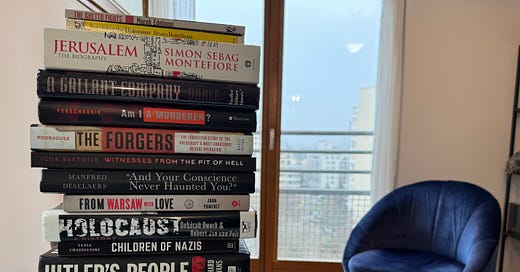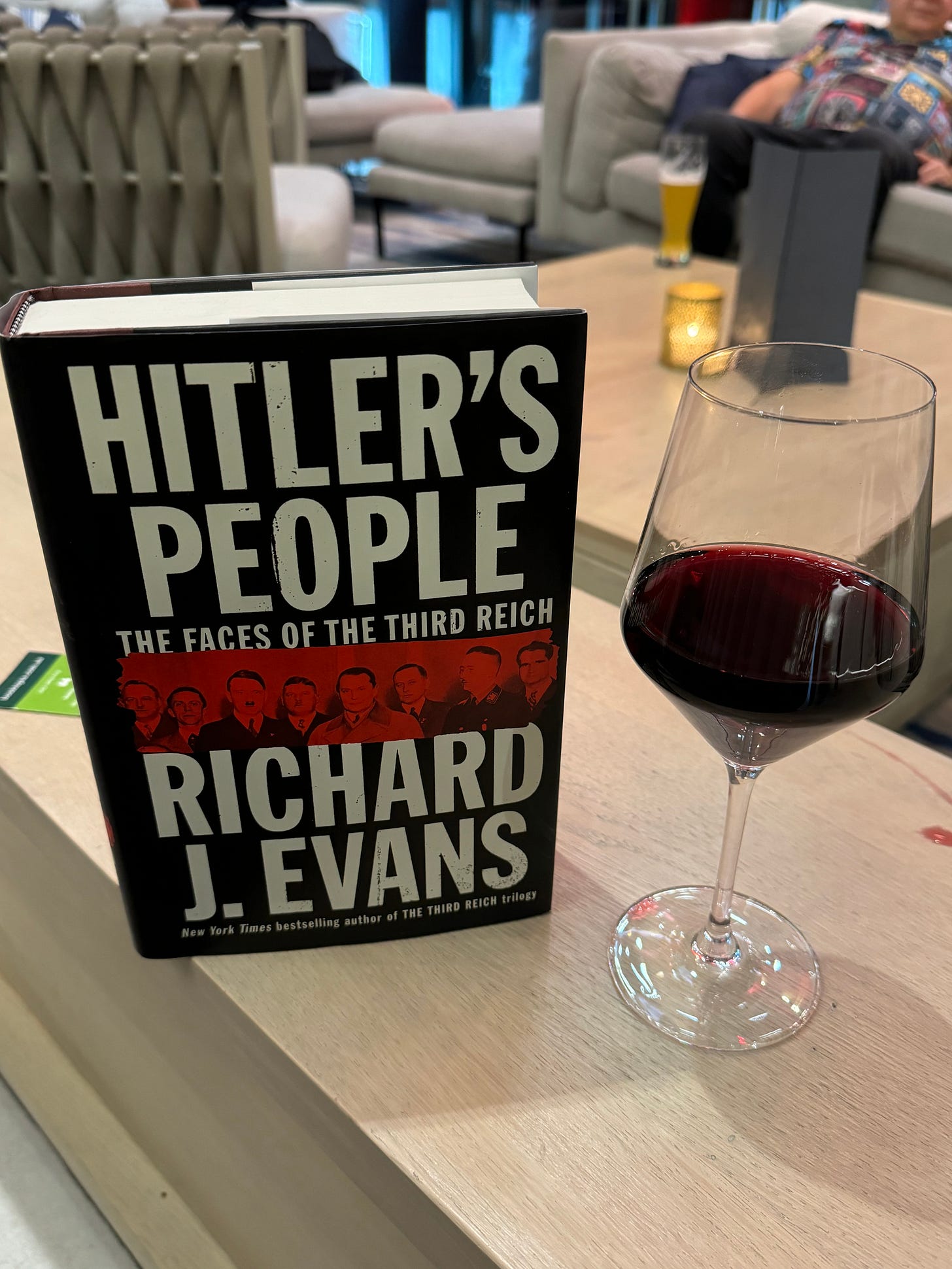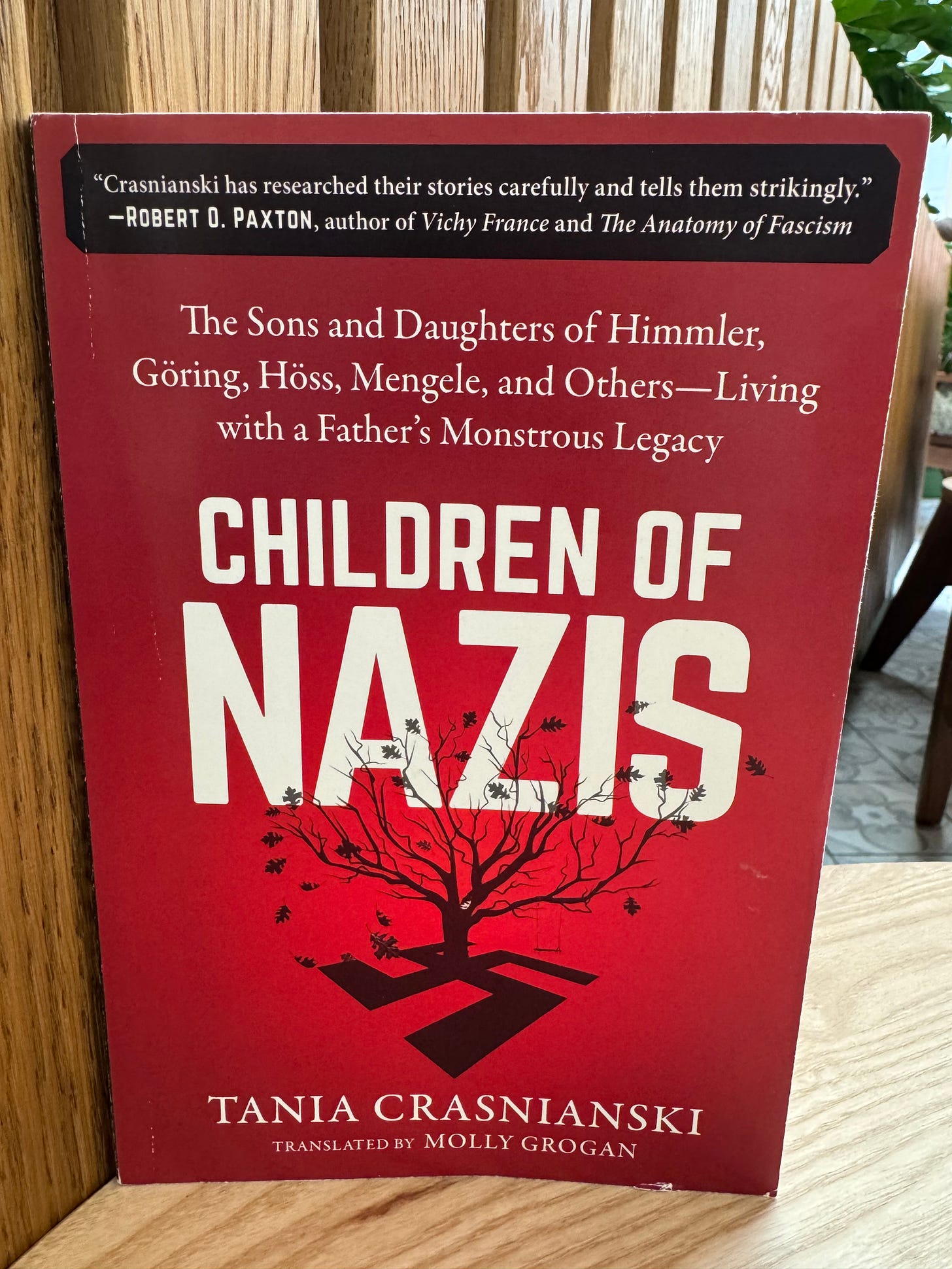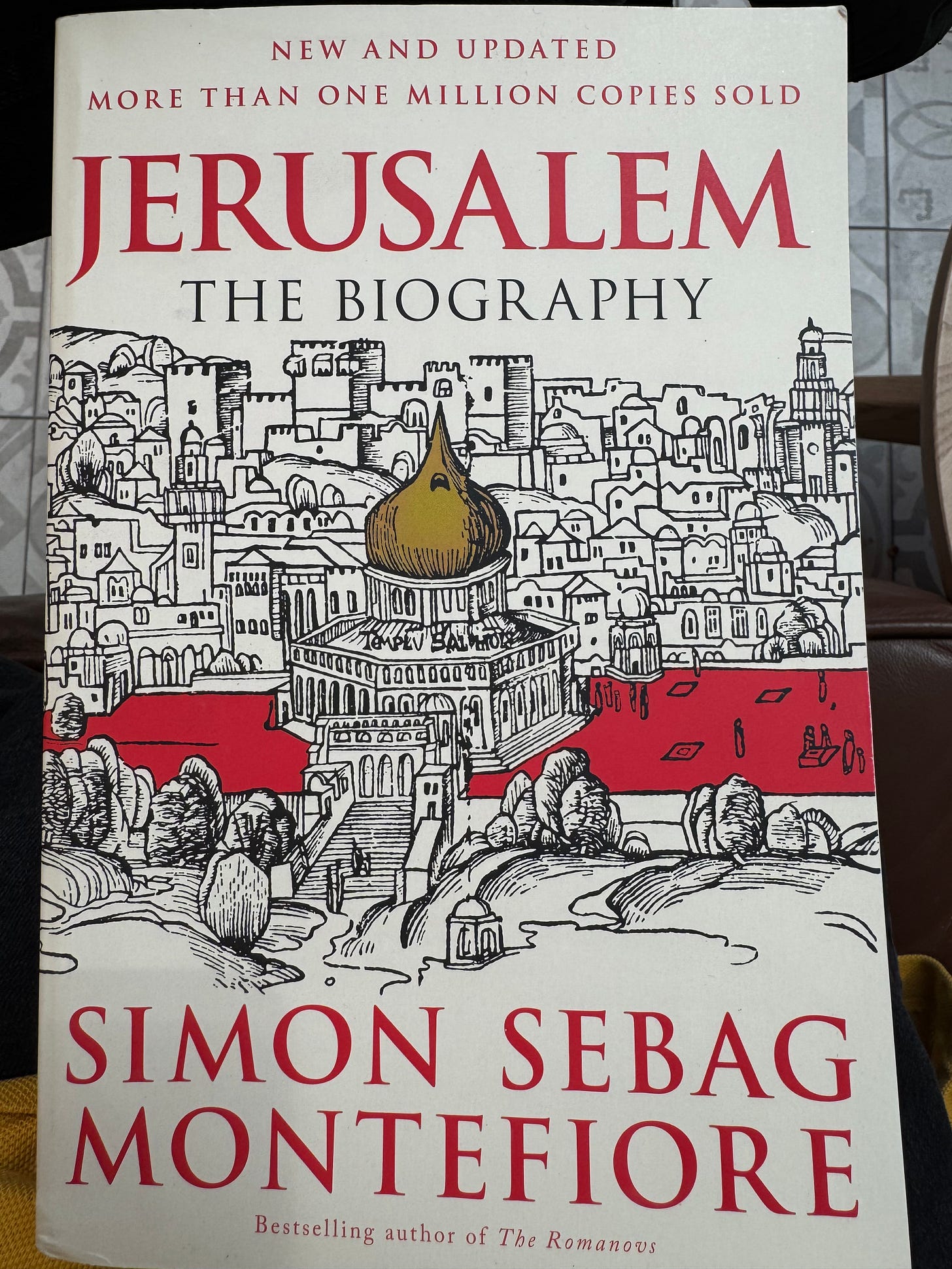Hi everyone,
I hope you have all had a wonderful start to 2025. It has been a whirlwind start for me, returning to Australia for 10 days for medical appointments (arthritic knees) and then back to Poland. A major deadline for the PhD is also upon me, hence not having written anything for a couple of weeks.
For this week’s post, I thought I’d reflect on the books I read on WWII and the Holocaust in 2024. I also highly recommend them all to you.
For 2025, I am excitedly awaiting delivery of a Polish authored book on General Stanislaw Maczek, the Commander of the Polish 1st Armoured Division who after D-Day fought their way through northern France, into Belgium, and Holland, before turning south towards Berlin. The book has finally been translated in English and was released on 31 December 2024. I’m also looking forward to finally reading “Trail of Hope” a book written by General Anders about he and his peoples journey from Siberia, through to the Middle East and defeating the Germans at Monte Cassino. I can’t wait!
The below list is in no particular order, nor do I think they have to be read in any particular order. I hope you enjoy reading them as much as I did. Although, at times, enjoy is likely not an appropriate word. Horror might be more appropriate.
The Colour of Courage – by Julian Kulski
This is an incredibly interesting book written by Kulski as a man looking back on his time as a young boy growing up in Warsaw during the occupation of Poland during WWII. It describes his time in the Scouts and his preparation for induction into the AK. He was turned away until he was considered old enough but had joined by the time of the outbreak of the 1944 Warsaw Uprising in which he fought gallantly. He spent much of the time fighting in the western Warsaw suburb of Zoliborz, the next suburb over from where I live in Warsaw.
Agent Zo - by Clare Mulley
A remarkable book about a remarkable woman by the name of Elzbieta Zawacka. I truly love such authorship that combine non-fiction information with the style of a novel, telling the factual story in a manner that leaves you craving to know what happens next. Zawacka was the first and only woman to train as one of the revered Polish Cichociemni the “Silent and Unseen” or more accurately in Polish the “Dark and the Quiet Ones”. The Cichociemni were Polish special forces trained by the SOE in Scotland and parachuted into Poland in the darkness of night with special missions. Zawacka is another Pole who we can consider a true legend!
I have communicated with author Clare Mulley and hope to interview her for the Substack soon.
Nazi Billionaires – by David de Jong
I think this is a book that many German companies would hope would not be written, but I think is very important for all of us to read. De Jong was a writer at the Wall Street Journal for many years and began this book as a series of articles on his investigative journalism into the companies owned by prominent Germans during WWII. It will likely surprise you the number big name brands we know today that profited from the Nazi war machine, from stealing property and businesses from Jews as well as the use of slave labour in their factories. Think BMW, VW, Siemans. There is also an interesting piece about what the descendants of those powerful men who built those companies are doing now and how they feel about the history of their wealth.
Hitler’s People – by Richard Evans
I personally love anything written by Richard Evans and he is also wonderful to watch in documentaries about WWII. I happily took this book on a one-week holiday I allowed myself and devoured it. In this book, Evans gives us a summary of many of the important figures in the Third Reich, including Hitler himself. In my opinion, this was Evans opinion piece on the normality of the Nazi figure heads and contributors. Rather than psychopathic or deranged as we would like to imagine them to be, he shows just how normal their lives were. I would rather state that having read the book, I came to further appreciate these men and woman as arrogant, narcissistic, and entitled, slimy and absolutely corrupt, both materially and in morals and ideology. I think Evans was also giving his observations about 1930’s Germany and what he sees in the world today – A caution if you will.
I have also corresponded with Evans and hope to interview him later in the year.
Holocaust: A history – by Deborah. Dwork & Robert Jan van Pelt
This book was a little different to the usual books about the functioning of the Holocaust machine. This one goes back before WWII and before WWI to investigate more about the origins of antisemitism and how the Germans got to the murder of millions of people. If you have seen the movie Denial, you will see a depiction of Jan van Pelt (and Richard Evens for that matter) in the movie, giving evidence on behalf of Deborah Lipstad and Penguin Books in their real life court battle with David Irving.
From Warsaw With Love – John Pomfret
Although discussing life and death operations, this book was a lot of fun. Who doesn’t love a great spy story? This book is about the relationship between the Polish and American spy agencies both during the Cold War, during Poland’s transition to democracy, and then as allies in the modern period. In particular, learn about the operation pulled off by the Poles that lead to the USA forgiving a significant portion of financial debt owed by Poland to the USA in its reconstruction.
And Your Conscience Never Haunted You – by Manfred Deselaers
I will admit the first half of this book was an easy and interesting read, however, it lost me in the second half as the author attempted to set the actions of Rudolf Hoss into a theological philosophical discussion. I do love philosophy, but this one was lost on me to be honest. The book was the result of a PhD level research project conducted by the author.
Witnesses from the Pit of Hell – by Igor Bartisik
A book written by an Auschwitz historian on the Sonderkommando. The Sonderkommando, or “special” commando, were the Jewish men who were selected by the SS at Auschwitz to operate the gas chambers and crematoria at all of the death camps. Whilst an SS member would always be responsible for the placing of Zyclon B into the gas chambers, the Jewish commando was responsible for shepherding victims into the gas chambers and then removing them after they’d died, remove hair and gold teeth, and burning them in the crematoria. These men should not be condemned by history but instead pitied. Many of them did not survive as they were direct witnesses to the Nazi death machine. They would last maybe four to six weeks before being gassed and burned themselves. The book attempts to give us a summary of evidence for what we know about the gas chambers of Auschwitz. I am not sure if it can be purchased online, I bought it at Auschwitz.
Children of Nazi’s – by Tania Crasnianski
This one I got through quickly as well. It was a fascinating investigation into what is known of the lives of the adult children of high level Nazi perpetrators. Their ideas about their parents as parents and as mass murderers, and how they live their lives today in the shadow of their parents crimes.
The Forgers – by Roger Moorehouse
Another wonderful book about Poland in WWII, written by a wonderful author. The story is about the network of diplomats throughout Eastern Europe who contributed to saving thousands of Jewish lives by supplying legitimate passports, illegitimately. Whilst we celebrate many of the brave men and women who risked their lives hiding Jews in their homes and shelters in their barns, it was actually the men and women of these diplomatic missions who saved the most lives. Moorehouse discusses the network in wonderful detail with a special focus on the Polish mission in Bern, Switzerland. Known as the Ładoś Group, after the Polish Ambassador Aleksander Ładoś, his underlings have been recognised as Righteous Among the Nations, whereas Ładoś, puzzlingly, has not.
I recently had a beer with Roger in London and thoroughly enjoyed our chat. I am also hoping to interview him soon as well.
Am I a Murderer – by Calel Perechodnik
I don’t even know where to start with this one and will perhaps simply leave it to you to pick and read for yourself. This is a heart wrenching true story about Perechodnik who became a Jewish Police Officer who assisted in the deportation of people from his own village to their deaths in the extermination camps. Two of those he helped to deport were his wife and child. Never forget!
A Galant Company: The Men of the Great Escape – by Jonathan Vance
I read this one before I ran my great Escape Tour at the beginning of 2024. I needed to learn more about the Great Escape and asked the Stalag Luft 3 museum Director what book he would recommend. It was this book that he recommended above many others. You’ve all seen the movie, now read the real story of the Great Escape.
Jerusalem: A Biography – by Simon Sebag Montefiore
I have to admit this one was only half finished in 2024. I still have the second half to read early this year. I wanted to read this one to better understand the issues surrounding the current war in the Middle East as well as always wanting to learn more about Jewish culture and history. Reading a book such as this also helps in learning about the origins of antisemitism and how the human race got to a place such as the Holocaust. Montefiore is known as an expert on the Middle East and Jerusalem. So far it is a fascinating read that delves into some of the finest minutia of a city many think it is the centre of the world.
The Ghetto Fights – by Marek Edelman
A very short account of 50 pages by the legendary ghetto fighter Marek Edelman. This remarkable man gives us just the facts on the beginning of the 1943 Warsaw Ghetto Uprising. There are possibly more pages written by the translator who summarises Edelman’s words and adds context. Some of the commentary of the translator is a little astounding, particularly as he is describing Edelman’s explanations of the assistance of the AK. Whereas Edelman gives great rational explanations and insight for the seemingly modest assistance given by AK, as well as the relationship between the AK and ZOB, the author has to add, ”but we can’t forget the antisemitism of the Poles”. Nowhere does Edelman mention antisemitism anywhere in his prose. Whilst this is disappointing, I highly recommend the book to everyone
Surviving the Holocaust – by Bruno Bettelheim
As a psychologist myself, the psychology involved in the Holocaust is of particular interest to me. Bettelheim was a psychologist himself and went on to write about the psychology of the Holocaust after surviving. His insights, whilst written decades ago, stand the test of time and provide remarkable ideas to ponder about the worst event in human history as well how people remembered and wrote about the Holocaust in the years that followed. If you can find it somewhere, I highly recommend you read this one. I am looking for more books written by Bettelheim.









Amazing collection - you know that period of history better than most Poles. To this list I would add just one position: Jan Karski “tajne państwo” (secret state). The book that you cannot forget.
Regarding the translator’s comment you mention on Edelmann: so interesting! Looking for sources on Edelmann for my story, I found (and reported) exact same comment by another American author. The fact that Edelman never spoke of antisemitism was difficult to many: https://open.substack.com/pub/nomadicmind/p/poland-vs-netanyahu-memory-on-trial?r=31fxoh&utm_medium=ios